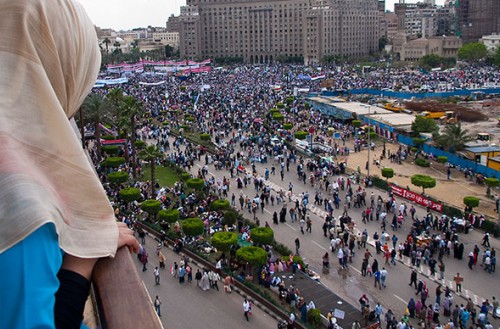Image: Tahrir Square, Egypt in 2011 (Photo: Flickr user James).
Imagine, for a moment, that you are the governance advisor to a development agency in an unnamed developing country. After years of stagnation, this country has recently been posting encouraging development results, with both rapid economic growth and strong progress towards the Millennium Development Goals.
For the most part, you find its government serious about development issues and rewarding to work with. But there is a hitch.
The government is an authoritarian regime, with a questionable record on elections, human rights, and civil liberties. Publicly, your own government professes support for these ideals, and is consequently under some pressure to cut back its aid programme; privately, it prefers to put its aid in countries where it can do the most good, so is intimating that money might continue to flow if a persuasive case can be made.
You yourself are ambivalent. Does it make good developmental sense to give aid to a high-achieving regime even though, or even because, it is authoritarian? Or are the developmental advantages of authoritarianism illusory?
The difficulty has only been heightened by recent events in the Arab Spring, which have shown not only how unpopular even relatively developmental authoritarianism can be, but also how difficult it is to replace it with something better.
Scratching your head, you turn to the academic cross-national statistical literature on the relationship between autocracy, democracy, and development. Frustratingly, the evidence here is not exactly crystal clear. Most studies fail to find statistically significant relationships, with the remainder split between those that find for or against autocracy or democracy.
More interesting, perhaps, is the finding that genuine democracy is more difficult to sustain than autocracy at low income levels, making autocracy, or some kind of flawed democracy, the most common type of regime for developing countries. Partly in consequence, authoritarian regimes make up the vast majority of big development successes and failures.
Another interesting finding is that growth under autocracies is more volatile than in democracies, with booms frequently giving way to spectacular busts.
Far from helping, however, this knowledge only seems to make your job more stressful. Is this country going to be one of the big authoritarian success stories? Or is its recent success a fluke? Worse, is it destined to become one of the big authoritarian growth failures? And is a democratic alternative viable here?
As I explain in a new DLP paper, comparative case studies on developmental states and studies of political settlements provide some guidance.
So, what are the main lessons of this literature? First, on democracy.
- Since 1969, only six developing countries have sustained a robust democracy that has combined regime change with a fairly full range of human rights and civil liberties. All, bar Costa Rica, experienced a long period of democratic tutelage under British colonial rule; and all, bar Costa Rica and India, were small island, plantation economies.
- Most other countries that have sustained a transition to democracy have fairly homogeneous ethnic and religious populations, a moderate degree of economic inequality and a large middle class.
- Transitions to democracy tend to upset economic growth, but if a democracy can be consolidated, the economic benefits grow over time.
- Mauritius is the only widely-agreed example of a developing country democracy that has grown strongly for 20 years or more; and Mauritius at independence had an atypical social structure for developing countries, with an unusually capable state.
- There is, however, a larger class of states with reasonably high democracy scores that appear to be ‘muddling through’ developmentally.
And what are the findings on authoritarian developers?
A market in Mauritius (Photo: Samovar Incentive).
These regimes usually face some acute combination of internal and external threats that stimulates the political will to grow the economy, earn revenue, and provide benefits for the mass of the population.
They can plan for the long term. This means they can approach development problems in an experimental and adaptive way. It also means they can develop the necessary bureaucratic capacity to transform policies into reality – which often involves forming policy coalitions with non-state actors.
As for the problem of succession, that is often dealt with by rooting the leadership in a well-institutionalised political party.
So the literature suggests a series of questions that governance advisors could usefully ask (see these in a flow chart).
- Does this regime have a political history, or a social and economic structure, that is likely to support a developmental democracy?
If the answer is ‘yes’, we may want to think hard about if and how a relatively painless transition to democracy could be supported. If the answer is ‘no’, we may want to ask:
Does this regime have a political history or a social and economic structure that is likely to support any kind of democracy, developmental or otherwise?
If the answer is ‘yes’, we should consider whether the democracy-induced gains in civil and political rights are likely to outweigh the human welfare losses (in terms of employment, income, effective service provision etc.) that the replacement of an ostensibly successful authoritarian model could bring.
If the answer is ‘no’, we can ask more questions:
- Is the regime facing significant internal or external threats that cannot be assuaged by means of aid and resource rents alone? Is leadership succession institutionalised? Does the leadership take the long-view, and has it developed adaptive policy-making processes and bureaucratic capacity accordingly?
If the answer to all three questions is ‘yes’, there are good reasons for thinking that this is not a developmental flash in the pan: good reasons, therefore, to continue recommending support. The choice is not between autocracy and democracy, but between more and less developmental authoritarian regimes. Not that we must fall silent on the issue of human rights, but that we need to be realistic about what is possible.
However, the choices are not always this clear.
If answers to the above questions are a mixture of ‘yeses’, ‘nos’ and ‘maybes’, we remain in a quandary. Could states like Uganda and Cambodia institutionalise their leadership successions? Can states like Ethiopia improve their bureaucratic capacity?
Unfortunately, transitions between political settlements, or at least the resulting developmental effects, remain understudied. Until more evidence is available, many advisors will continue to scratch their heads.











